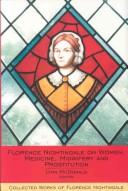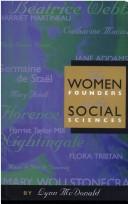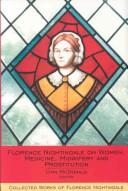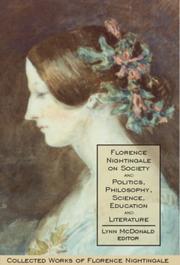| Listing 1 - 10 of 17 | << page >> |
Sort by
|

ISBN: 1280280816 9786610280810 0889209162 142372478X 9781423724780 0889204667 9780889204669 9780889209169 Year: 2005 Publisher: Waterloo, ON : Wilfrid Laurier University Press,
Abstract | Keywords | Export | Availability | Bookmark
 Loading...
Loading...Choose an application
- Reference Manager
- EndNote
- RefWorks (Direct export to RefWorks)
Volume 8: Florence Nightingale on Women, Medicine, Midwifery and Prostitution makes available a great range of Florence Nightingale's work on women: her pioneering study of maternal mortality in childbirth ('Introductory Notes on Lying-in Institutions'), her opposition to the regulation of prostitution through the Contagious Diseases Acts (attempts to stop the legislation and otherwise to facilitate the voluntary treatment of syphilitic prostitutes), her views on gender roles, marriage and measures for income security for women and excerpts from her draft (abandoned) novel. There is correspondence with women friends and colleagues from childhood to old age, on a vast range of subjects. Correspondents include old family friends, royal and notable personages, nuns and colleagues in various causes. Most of this material has not been published before and some letters wil be new even to Nightingale scholars. Altogether a very different view of Nightingale emerges from what normally appears in biographies and other secondary sources. This material will enable a new assessment of her feminism, her relations with women and her contribution to improving the status of women of her time.
Women's hospitals --- Women's health services --- Women --- Human females --- Wimmin --- Woman --- Womon --- Womyn --- Females --- Human beings --- Femininity --- Health services for women --- Medical care --- Gynecologic and obstetric hospitals --- Hospitals, Gynecologic and obstetric --- Lying-in hospitals --- Maternity hospitals --- OB-GYN hospitals --- Obstetrics hospitals --- Specialty hospitals --- Social conditions --- Services for --- Hospitals --- Nightingale, Florence, --- フローレンスナイチンゲール, --- Social conditions.
Book
ISBN: 1282856642 9786612856648 0773564322 9780773564329 9781282856646 0773511245 9780773511248 6612856645 Year: 1993 Publisher: Montreal : McGill-Queen's University Press,
Abstract | Keywords | Export | Availability | Bookmark
 Loading...
Loading...Choose an application
- Reference Manager
- EndNote
- RefWorks (Direct export to RefWorks)
Against these contentions she shows, for example, that women social thinkers have been active in every age since the sixteenth century. McDonald presents these women's work as evidence of the way in which the empirical social sciences have been employed by social reformers, including advocates for the equality of women, to challenge the state and those in authority. She argues as well that Weber's "interpretative sociology" has been misinterpreted, citing his extensive, but usually ignored, quantitative work. Despite the supposed opposition of interpretative and mainstream sociology, McDonald maintains that many of the founders of the discipline explored both. Covering the important eras in the development of the social sciences, she deals with the early Greeks, the seventeenth-century emergence of the scientific method (especially Bacon, Descartes, and Locke), the French Enlightenment, (especially Voltaire, Diderot, Condorcet, and Germaine de Staël), and British moral philosophy (especially Hume, Smith, and Catharine Macauley). From the nineteenth century she includes figures such as Marx, Durkheim, Weber, Quetelet, Harriet Martineau, Florence Nightingale, J.S. Mill, Harriet Taylor Mill, and Beatrice Webb.
Social sciences --- Civilization --- Cultural history --- History. --- Sciences sociales --- History --- Histoire

ISBN: 0773591850 9780773591851 0773523499 9780773523494 1306398347 Year: 2013 Publisher: Montreal & Kingston, Canada ; London ; Ithaca, [New York] : McGill-Queen's University Press,
Abstract | Keywords | Export | Availability | Bookmark
 Loading...
Loading...Choose an application
- Reference Manager
- EndNote
- RefWorks (Direct export to RefWorks)
Ground-breaking and original, this book debunks the myth that empirical social science has been dominated by its male founders and methodologists. The author re-analyses the critical role British, French and American women played in creating the field from the 16th through the early 20th centuries. Included are Mary Astell, Mary Wollstonecraft, Harriet Martineau, Beatrice Webb, Catharine Macauley, Florence Nightingale, Madame de Staël and Jane Addams.
Social sciences --- Women social scientists --- Social scientists --- Women in the social sciences --- Women scientists --- Behavioral sciences --- Human sciences --- Sciences, Social --- Social science --- Social studies --- Civilization --- History. --- Methodology --- Women social scientist
Book
ISBN: 1554587441 1280925027 9786610925025 0889207038 9780889207035 Year: 1998 Publisher: Waterloo, Ont. : Wilfrid Laurier University Press,
Abstract | Keywords | Export | Availability | Bookmark
 Loading...
Loading...Choose an application
- Reference Manager
- EndNote
- RefWorks (Direct export to RefWorks)
Revolution, abolition of slavery, public health care, welfare, violence against women, war and militarism — such issues have been debated for centuries. But much work done by women theorists on these traditional social and political topics is little known or difficult to obtain. This new anthology contains significant excerpts not normally included in standard collections. Women Theorists on Society and Politics brings together scarce, previously unpublished and newly translated excerpts from works by such women theorists as Emilie du Châtelet, Germaine de Staël, Catharine Macaulay, Mary Wollstonecraft, Flora Tristan, Harriet Martineau, Florence Nightingale, Beatrice Webb and Jane Addams. It focuses on eighteenth- and nineteenth-century writers, but also includes some selections from as early as the Renaissance and late seventeenth century. Introductions to the material, biographical background and secondary sources enhance this important collection. Women Theorists on Society and Politics provides essential theory on standard topics and a balance to the anthologies of feminist writing now more commonly available.
Femmes politiques --- Femmes specialistes des sciences sociales --- Sciences sociales --- Science politique --- Women political scientists --- Women social scientists --- Political science --- Social sciences --- Political scientists --- Social scientists --- Women in the social sciences --- Women scientists --- Behavioral sciences --- Human sciences --- Sciences, Social --- Social science --- Social studies --- Civilization --- Histoire. --- Philosophie --- History. --- Philosophy --- State, The --- History of theories
Book
ISBN: 0228013194 Year: 2022 Publisher: Montreal ; Kingston ; London ; Chicago : McGill-Queen's University Press,
Abstract | Keywords | Export | Availability | Bookmark
 Loading...
Loading...Choose an application
- Reference Manager
- EndNote
- RefWorks (Direct export to RefWorks)
Florence Nightingale is known as a hospital reformer, a social reformer, and the founder of professional nursing; few realize that she worked closely with doctors on these issues. As Nightingale’s first supporters and colleagues, doctors contributed to reducing the high death rates in Crimean War hospitals and learned from the consequential reforms.Beginning with an overview of Nightingale’s life and continuing with an exploration of her Crimean War work with army doctors, her post-Crimea work with civilian doctors, and her collaborations with the peacetime army and with army doctors in later wars, Lynn McDonald details the involvement of doctors in Nightingale’s legacy. At a time when hospitals’ death rates were universally high (including at top teaching hospitals), Nightingale formed connections with leading public health doctors and produced heavily cited work on safer hospital design. Her later writings cover her relations with early women doctors and the controversy over state regulation of nurses, bacteriology, and germ theory; here, McDonald argues against flawed secondary literature and the myth of Nightingale’s lifelong opposition to germ theory. The final chapter discusses the legendary nurse’s enduring legacy.Florence Nightingale and the Medical Men provides timely insight into Nightingale’s principles of disease prevention, data visualization, and the impacts of high disease and death rates – issues that persist in the global health crises of the twenty-first century.
Health care reform --- Hospital care --- Mentoring in medicine --- Nursing --- History --- Safety measures

ISBN: 1280925426 9786610925421 0889207054 1417542365 9781417542369 0889203717 9780889203716 9780889207059 9781280925429 6610925429 Year: 2002 Publisher: Waterloo, Ont. : Wilfrid Laurier University Press,
Abstract | Keywords | Export | Availability | Bookmark
 Loading...
Loading...Choose an application
- Reference Manager
- EndNote
- RefWorks (Direct export to RefWorks)
This third volume in the Collected Works of Florence Nightingale reports her controversial theological essays (only two of which have been previously published) and a great array of correspondence, from such Roman Catholics as Cardinal Manning and the Reverend Mother of the Sisters of Mercy of Bermondsey to the liberal Protestant Benjamin Jowett, evangelicals and missionaries. Nightingale's recommendations for a revision of the Bible for schoolchildren and excerpts from her devotional reading are given.
Église --- Protestantisme. --- Theologie. --- Church --- Protestantism. --- Theology. --- Catholicity --- Christianity --- Church history --- Protestant churches --- Reformation --- Christian theology --- Theology --- Theology, Christian --- Religion --- Catholicite. --- Catholicity. --- Universality --- Nightingale, Florence, --- フローレンスナイチンゲール, --- Religion.

ISBN: 1280925388 9786610925384 0889207062 1417543841 9781417543847 0889203660 9780889203662 9780889207066 Year: 2001 Publisher: Ontario : Wilfrid Laurier University Press,
Abstract | Keywords | Export | Availability | Bookmark
 Loading...
Loading...Choose an application
- Reference Manager
- EndNote
- RefWorks (Direct export to RefWorks)
Florence Nightingale (1820-1910) is widely known as the heroine of the Crimean War and the founder of the modern profession of nursing. She was also a scholar and political activist who wrote and worked assiduously on many reform causes for more than forty years. This series will confirm Nightingale as an important and significant nineteenth-century scholar and illustrate how she integrated her scholarship with political activism. Indispensable to scholars, and accessible and revealing to the general reader, it will show there is much more to know about Florence Nightingale
Biographies spirituelles --- Spiritual biography --- Spiritual odysseys --- Spiritual quests --- Biography --- Religious biography --- Nightingale, Florence, --- フローレンスナイチンゲール, --- Religion. --- Bible --- Critique, interpretation, etc. --- Criticism, interpretation, etc. --- Nurses

ISBN: 1280925515 9786610925513 0889207046 1417544740 0889203873 9780889203877 9781417544745 9780889207042 9781280925511 6610925518 Year: 2001 Publisher: Waterloo, Ont. : Wilfrid Laurier University Press,
Abstract | Keywords | Export | Availability | Bookmark
 Loading...
Loading...Choose an application
- Reference Manager
- EndNote
- RefWorks (Direct export to RefWorks)
Florence Nightingale: An Introduction to Her Life and Family introduces the Collected Works by giving an overview of Nightingale's life and the faith that guided it and by outlining the main social reform concerns on which she worked from her call to service at age sixteen to old age. This volume reports correspondence (selected from the thousands of surviving letters) with her mother, father and sister and a wide extended family. There is material on Nightingale's domestic arrangements, from recipes, cat care and relations with servants to her contributions to charities, church and social reform causes. Much new and original material comes to light, and a remarkably different portrait of Nightingale, one with a more nuanced view of her family relationships, emerges.
Nurses --- Nightingale, Florence, --- フローレンスナイチンゲール, --- nursing, medical history, Nightingale biography.

ISBN: 1280280603 9786610280605 0889209332 1417563974 9781417563975 0889204519 9780889204515 9780889209336 Year: 2004 Publisher: Waterloo, Ont. : Wilfrid Laurier University Press,
Abstract | Keywords | Export | Availability | Bookmark
 Loading...
Loading...Choose an application
- Reference Manager
- EndNote
- RefWorks (Direct export to RefWorks)
This seventh volume in the Collected Works of Florence Nightingale consists of letters, observations, and notes from Florence Nightingale's many trips to Europe, beginning with a family journey when she was a teenager. It includes annotations she made on opera libretti from her ""music mad"" phase and her winter in Rome (1847-48) which were so important in shaping her liberal politics and support for independence movements. Her letters and notes from Greece and central Europe in 1850, and her Kaiserswerth stay in 1851, reveal her developing ideas on social reform, as well as her f
Reformatrices sociales --- Infirmieres --- Women social reformers --- Nurses --- Social reformers --- Nightingale, Florence, --- フローレンスナイチンゲール, --- Voyages --- Travel --- Europe --- Descriptions et voyages. --- Description and travel. --- Description and travel

ISBN: 1280925795 9786610925797 0889207070 0889204292 9780889204294 9780889207073 Year: 2003 Publisher: Waterloo, Ont. : Wilfrid Laurier University Press,
Abstract | Keywords | Export | Availability | Bookmark
 Loading...
Loading...Choose an application
- Reference Manager
- EndNote
- RefWorks (Direct export to RefWorks)
Florence Nightingale on Society and Politics, Philosophy, Science, Education and Literature, Volume 5 in the Collected Works of Florence Nightingale, is the main source of Nightingale's work on the methodology of social science and her views on social reform. Here we see how she took her ""call to service"" into practice: by first learning how the laws of God's world operate, one can then determine how to intervene for good. There is material on medical statistics, the census, pauperism and Poor Law reform, the need for income security measures and better housing, on crime, g
Nightingale, Florence, --- フローレンスナイチンゲール, --- Grande-Bretagne --- Great Britain --- Civilisation --- Politique et gouvernement --- Politique sociale. --- Civilization --- Politics and government --- Social policy. --- Nurses
| Listing 1 - 10 of 17 | << page >> |
Sort by
|

 Search
Search Feedback
Feedback About UniCat
About UniCat  Help
Help News
News